Video games have been everywhere this year, especially in the last couple months. You haven't been able to pick up a newspaper or news magazine without reading something about video games—whether it's long lines camping out for the PlayS tation 3 or Wii, violence over these scarce systems, or sensational stories about anti-game-violence crusaders like Jack Thompson. Gaming is everywhere, it's more mainstream than ever, and 2006 was a huge year for everyone involved.
tation 3 or Wii, violence over these scarce systems, or sensational stories about anti-game-violence crusaders like Jack Thompson. Gaming is everywhere, it's more mainstream than ever, and 2006 was a huge year for everyone involved.
Three major corporations are fighting for your home console video game dollars. Two of them launched their big next-generation systems just last month, while the third's new system has enjoyed a year on the market. "Next-generation" is now the "current generation" and we can stop looking forward to that amazing system on the horizon, at least for a couple of years until we read 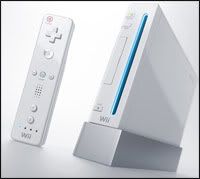 about the impressive leaked specs of the PlayStation 4, Xbox 720, or whatever.
about the impressive leaked specs of the PlayStation 4, Xbox 720, or whatever.
Of course, gaming on the PC rolled on as it always has, with respectable sales and a few critical successes. It's never as popular as console gaming, but that's comparing a single platform against multiple others; compared with any other single platform, the PC game sales stack up very well. Let's take a look at the gaming market trends over the past year, and predict what will happen in 2007.
A Good Year for Microsoft and Nintendo
Nintendo had a great year in 2006. Though it endured the snickering of a million hardcore gamers when it announced its next system would be named the "Wii," Nintendo looks like it's getting the last laugh. A system only somewhat more po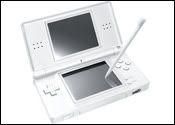 werful than the previous generation GameCube, the Wii instead focuses on an impressive new way to control games—with motion. The mainstream press just ate it up, with talk-show hosts and celebrities flailing their arms about playing casual games and laughing like little kids. The Wii became a "must have" item, and they're flying off shelves as fast as Nintendo can make them. It doesn't hurt that the price is significantly lower than competing consoles, either. Hardcore gamers are snapping up Wii's for the latest Zelda game, one of the best in a series known for outstanding quality.
werful than the previous generation GameCube, the Wii instead focuses on an impressive new way to control games—with motion. The mainstream press just ate it up, with talk-show hosts and celebrities flailing their arms about playing casual games and laughing like little kids. The Wii became a "must have" item, and they're flying off shelves as fast as Nintendo can make them. It doesn't hurt that the price is significantly lower than competing consoles, either. Hardcore gamers are snapping up Wii's for the latest Zelda game, one of the best in a series known for outstanding quality.
The real star of 2006 for Nintendo is the DS handheld, though. The system was released two years ago, but the new, slimmer, sleeker DS Lite flooded the market this Spring/Summer and took off like a rocket. Combined with a stellar game library full of titles for both hardcore gamers and non-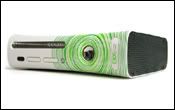 gamers (like your parents), sales of the Nintendo DS are absolutely crushing its major competition, the PlayStation Portable, especially in its home country of Japan. So successful is the DS that Square/Enix just announced that the ninth in their long-running and ridiculously popular Dragon Quest series would debut on the handheld system. This is big news: The main Dragon Quest games (there are spin-offs, too) have always been made for major home consoles rather than handhelds, and they're responsible for tons of system sales, especially in Japan.
gamers (like your parents), sales of the Nintendo DS are absolutely crushing its major competition, the PlayStation Portable, especially in its home country of Japan. So successful is the DS that Square/Enix just announced that the ninth in their long-running and ridiculously popular Dragon Quest series would debut on the handheld system. This is big news: The main Dragon Quest games (there are spin-offs, too) have always been made for major home consoles rather than handhelds, and they're responsible for tons of system sales, especially in Japan.
Microsoft had a pretty good year as well. The Xbox 360 suffered some pretty dire shortages when it launched worldwide last holiday season, but at least the company managed to stick to its plan to launch in all three major territories (North America, Europe, Japan) nearly simultaneously. Since then, production has gone up, Microsoft's costs have gone down, and plenty of great games have been released. The system's first major blockbuster, Gears of War, seems to live up to the hype: Review scores are excellent, and the game has sold over 2 million units in its first month. Microsoft is a little behind on its very bullish prediction from early in the year that it would sell 10 million Xbox 360 consoles before Sony launched the PlayStation 3, but it's close, and it looks on track to reach that goal by year's end. Recently, the release of Blue Dragon has actually picked up sales in Japan, where the Xbox 360 has thus far failed miserably.
Xbox Live is the real star for Microsoft. The service has seen several upgrades and improvements over the year, from UI changes and digital media enhancements to a flood of games on the Xbox Live Arcade. Gamers flocked to hot downloadable game demos like Fight Night Round 3 and Dead Rising, and publishers noticed a measurable boost in sales. So, while Microsoft didn't quite do as well as their aggressive plans from a year ago, it still managed to close out 2006 with some very impressive numbers, plenty of buzz, and very positive critical reception.
A Tough Year for Sony
In stark contrast to Microsoft and Nintendo, Sony has had a very rough year. The PSP, such a hot product when it was released, has still been selling pretty well. The software lineup is decent and improving. Yet it can't seem to come anywhere close to the sales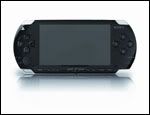 of Nintendo's DS Lite, and it doesn't have a blockbuster, gotta-have-it game that everyone is talking about. The quirky Loco Roco wasn't the breakout hit Sony hoped it would be, despite being a thoroughly charming and excellent game.
of Nintendo's DS Lite, and it doesn't have a blockbuster, gotta-have-it game that everyone is talking about. The quirky Loco Roco wasn't the breakout hit Sony hoped it would be, despite being a thoroughly charming and excellent game.
Sony's real problems are PlayStation 3 related, though. The PSP's second-fiddle sales are downright inspiring by comparison. As late as February, Sony assured the public and investors that "There is no change in our original plan to release the console in Spring 2006," the date it has promised since the E3 Expo in May of 2005. Then, three weeks later when Spring had sprung, Sony finally officially admitted that the system wouldn't release until November. At the E3 Expo this year, Sony unveiled pricing that was far higher than anyone anticipated, but promised that the worldwide launch was 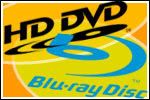 on track. In fact, the company said production was going to be so good that it would have 2 million systems for launch, ship 4 million by the end of 2006, and 6 million by the end of Sony's fiscal year in March 2007. There was a PowerPoint slide and everything. But Sony's E3 press conference was a disaster. Sony fans and gaming press were bored stiff, and genuinely unimpressed by the quality of most of the games on display. The price was higher than expected. Blu-ray supporters worried that the delayed launch would help HD-DVD secure a foothold in the market and create stiffer competition in high-def movie formats.
on track. In fact, the company said production was going to be so good that it would have 2 million systems for launch, ship 4 million by the end of 2006, and 6 million by the end of Sony's fiscal year in March 2007. There was a PowerPoint slide and everything. But Sony's E3 press conference was a disaster. Sony fans and gaming press were bored stiff, and genuinely unimpressed by the quality of most of the games on display. The price was higher than expected. Blu-ray supporters worried that the delayed launch would help HD-DVD secure a foothold in the market and create stiffer competition in high-def movie formats.
The bad news didn't stop there. Sony hit Europe with another delay, pushing their launch out a second time to Spring 2007. Launch quantities dropped, and Sony's promise changed from 2 million at launch to maybe 500,000 at launch, with 2 million shipped by the end of the year instead of 4 million. Analysts now say the company managed even less than that, and consider the company lucky to get 1 million units in stores by the end of the year.
Customers lined up to buy PlayStation 3 consoles for days before it went on sale, and it looked like demand for the system would keep Sony on top. It then appeared that much of that demand was from customers who only wished to quickly "flip" the console on eBay or other online auction sites for a huge profit, taking advantage of the very small shipment numbers Sony had been able to muster. Critical reception to the PS3 games has been lukewarm at best, with only one or two standout titles like Resistance: Fall of Man. Titles available on both the PS3 and Xbox 360 don't look or play any better on the PS3, and in fact many gaming press outlets have been running side-by-side comparisons that favor Microsoft's less expensive console. Customers wishing to actually play the PS3 instead of sell it were frustrated to find that the system doesn't come with the necessary cables for high definition—neither component nor HDMI.
Despite the half-year delay, Sony's hot new console is plagued with technical problems. There are issues with scaling on TVs that don't support 720p, issues with the backward compatibility making PS2 games look worse than they do on an actual PS2, problems with some of the system software functions, problems with the wireless controllers losing their synchronization with the console, and so on. The PS3 has already had several firmware updates in the few weeks since its release, to fix minor problems and add features, but it still feels as though, despite considerable delays, the PS3's software is only half-finished.
Consoles in 2007
2007 is going to be a very interesting year for the console wars. Nintendo is off to a fantastic start with the Wii, and it appears the system built specifically to appeal to non-gamers and broaden the market has done just that—everyone who plays one says it's fun and wants one. That initial enthusiasm doesn't always translate into sales, though, much less extended sales. Once the talk shows 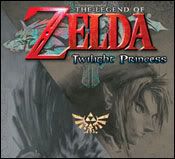 and morning shows and news updates about the "hot holiday items" wear off, will those non-gaming masses still care? Will the idea of possibly purchasing or trying out this thing even cross their minds? Will Nintendo be able to keep the hot titles flowing fast enough to keep the core gaming demographic interested? After all, Zelda was a huge hit at launch, but nothing else has done very well, and the critical reception for other Wii titles is fairly poor. Nintendo's job throughout 2007 will be to keep the Wii fresh, keep it in the mainstream press as much as possible, and target it toward an expanding market that reaches beyond core gamers. It also has to prove that the sad reputation of the GameCube—only 2 or 3 Nintendo franchise games a year really worth getting for it—won't hold true. Nintendo needs to crank out the Wii hits, and bring forth plenty of great exclusive games from third-party publishers. That's not an easy task.
and morning shows and news updates about the "hot holiday items" wear off, will those non-gaming masses still care? Will the idea of possibly purchasing or trying out this thing even cross their minds? Will Nintendo be able to keep the hot titles flowing fast enough to keep the core gaming demographic interested? After all, Zelda was a huge hit at launch, but nothing else has done very well, and the critical reception for other Wii titles is fairly poor. Nintendo's job throughout 2007 will be to keep the Wii fresh, keep it in the mainstream press as much as possible, and target it toward an expanding market that reaches beyond core gamers. It also has to prove that the sad reputation of the GameCube—only 2 or 3 Nintendo franchise games a year really worth getting for it—won't hold true. Nintendo needs to crank out the Wii hits, and bring forth plenty of great exclusive games from third-party publishers. That's not an easy task.
Sony has its work cut out for it. Despite the company's protests, everybody knows (and sales records have confirmed) that shipments have been below expectation and Sony has to make desperate improvements to increase supply. With a major region launch coming in the Spring (that usually requires stockpiling hundreds of thousands of units), that's going to be tough. The PS3 is at a price disadvantage, and Sony is already taking a big loss on each unit sold. It will be hard for them to reduce the price, but that needs to happen quickly. Many of the hot PS3 exclusives, like Metal Gear Solid 4 and Final Fantasy XIII, are only maybe going to be done in time for a 2007 release. In short, Sony has precious little time to lower the PS3's price, fix all the little software flaws and glitches, add competitive online features to better stack up against Xbox Live, and release totally awesome exclusive games. Sony will be very busy in 2007.
 Oddly enough, Microsoft seems to be in the best position moving into 2007. Its approach is less risky than Nintendo's and less reliant on shaking up the buying habits of millions of non-gamers. Thanks in part to some software delays (like Forza Motorsport 2, the lineup of exclusive titles for 2007 looks very good. Even the first six months of the year has several potential blockbusters in store. Thanks in part to Blue Dragon and some other imminent releases, Japan is starting to take notice of the Xbox 360. Sales are still not stellar and it is doubtful that we'll see a huge explosion in Japanese Xbox 360 sales in 2007, but the numbers should climb from "insignificant" to "a meaningful part of the business." And then there's Halo 3, part of a franchise so big that it will probably be responsible for millions of 360 purchases alone. Grand Theft Auto 4 will ship simultaneously on the PlayStation 3 and Xbox 360, taking a very important feather out of Sony's cap. What was once an exclusive to Sony's platform and a big system-seller will now be available on both platforms, and the 360 will be the less expensive of the two ways to jump into the game.
Oddly enough, Microsoft seems to be in the best position moving into 2007. Its approach is less risky than Nintendo's and less reliant on shaking up the buying habits of millions of non-gamers. Thanks in part to some software delays (like Forza Motorsport 2, the lineup of exclusive titles for 2007 looks very good. Even the first six months of the year has several potential blockbusters in store. Thanks in part to Blue Dragon and some other imminent releases, Japan is starting to take notice of the Xbox 360. Sales are still not stellar and it is doubtful that we'll see a huge explosion in Japanese Xbox 360 sales in 2007, but the numbers should climb from "insignificant" to "a meaningful part of the business." And then there's Halo 3, part of a franchise so big that it will probably be responsible for millions of 360 purchases alone. Grand Theft Auto 4 will ship simultaneously on the PlayStation 3 and Xbox 360, taking a very important feather out of Sony's cap. What was once an exclusive to Sony's platform and a big system-seller will now be available on both platforms, and the 360 will be the less expensive of the two ways to jump into the game.
Microsoft is entering the second year of production for the Xbox 360. Costs are already under control, with analysts claiming that Microsoft is already breaking even (or better) on each unit sold. With a move to smaller, cooler, more energy efficient 65 nanometer processors assumed to happen in the first half of 2007, the time is ripe for an Xbox 360 price cut. This is going to be hard for Sony to match with the PlayStation 3. Exciting things are afoot with Xbox Live. Microsoft added a video marketplace this year: Will that expand to music in 2007? Will there be a subscription model? The XNA Game Studio Express program that lets common programmers make Xbox 360 games without buying expensive development kits was just released. In 2007, we should see some sort of method for all Xbox 360 users to sample these homebrew projects. If this takes off, it could be a major point of differentiation between platforms.
Microsoft's main challenge is going to be making sure that launching early doesn't turn around to bite them. It has to remind consumers that the Xbox 360 is every bit as "next-generation" as the PlayStation 3 and convince them that the lower price does not mean inferior graphics or gameplay. The Xbox 360 has to continue to be seen as the "hot new thing" or risk being increasingly pushed aside along with the previous generation PS2, GameCube, and Xbox. It also has to make good on many of its release dates, and avoid pushing big franchises back to 2008.
The big unknowns? What will Microsoft do with the hardware? Will the next iteration of the Xbox 360 be more than just less expensive? Will it be quieter? Will it include built-in Wi-Fi, a bigger hard drive, or an HDMI port?
PC Gaming in 2007
Consoles aren't going to get all the love in 2007. You could definitely state that PC Gaming was in a lull in 2006. There was the usual hardware upgrade cycle and some very good games, sure, but nothing that really shook the earth. 2007 is shaping up to be a little different.
First, there's Microsoft's Games for Windows program. Already a few titles have the GFW branding, but we'll see a lot more in 2007. Games with GFW branding will have unified packaging and more  prominent placement in stores, sort of like console games do. It also guarantees a certain level of compatibility and support: GFW games have to work in widescreen modes, have to work with Vista's Games Explorer—stuff like that. Technical issues aside, GFW is a big push from Microsoft to get PC games off the back shelf at your local games store and put them up front and center with the console games. The program is off to a slow start, mostly because Vista hasn't shipped yet, and it'll be a bigger priority in 2007.
prominent placement in stores, sort of like console games do. It also guarantees a certain level of compatibility and support: GFW games have to work in widescreen modes, have to work with Vista's Games Explorer—stuff like that. Technical issues aside, GFW is a big push from Microsoft to get PC games off the back shelf at your local games store and put them up front and center with the console games. The program is off to a slow start, mostly because Vista hasn't shipped yet, and it'll be a bigger priority in 2007.
Vista brings more than just a focus on Games for Windows branding for PC games. It brings some much-needed parental controls and easier, more logical access to games with the Games Explorer. Most importantly, Vista is the only place you'll find DirectX 10. Nvidia's DX10 graphics cards have already shipped, and ATI's are due out early in 2007. DX10 adds nifty new capabilities and performance to PC graphics, and the first DX10 games should be pretty stunning.
Then there's Live Anywhere, Microsoft's promise to bring the Live platform off the Xbox and connect both Vista PCs and cell phones. We have no idea how well the cell phone thing is going (we should see some sort of release in 2007), but Live will launch on the PC early in 2007 with the releases of Shadowrun and Halo 2. We hope to learn a lot more about this at the CES show in January, but don't expect every feature of Xbox Live in the very first release. Some stuff will be in there, the rest will come in future updates. By the end of 2007, PCs with Windows Vista should be fully Live-ified. And if you don't think that's a big deal for PC gaming, you clearly don't own an Xbox 360.
If Vista does anything for PC games, it raises the bar on system requirements. Vista will simply require more RAM and CPU power than old-and-busted Windows XP, and the Aero interface demands a certain level of DirectX 9–capable graphics that the average el-cheapo computer of today simply doesn't have. It is forcing PC manufacturers to ship low-end systems with a bit more power, especially in the areas currently holding back game developers the most (graphics and RAM). With Microsoft selling 80 million or more copies of Vista next year, game developers will be given a new platform, and a new (better!) set of minimum requirements to hit. Game development is a lengthy process, and it takes time for new platforms to gain market share, so the real effects of this transition might not be felt until 2008. In two years, we will hopefully look back at the launch of Vista as the time when PC games took a significant leap forward.

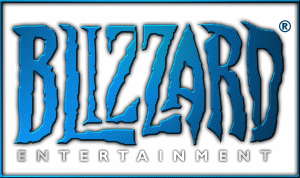
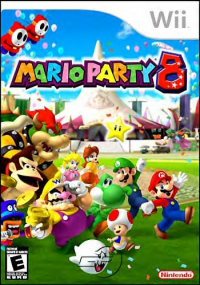
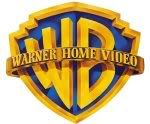 SCi Entertainment Group
SCi Entertainment Group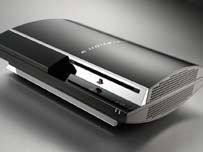
 Electronic Arts will be bringing the award-winning mobile game Orcs and Elves to Europe in February next year.
Electronic Arts will be bringing the award-winning mobile game Orcs and Elves to Europe in February next year.  tation 3 or Wii, violence over these scarce systems, or sensational stories about anti-game-violence crusaders like Jack Thompson. Gaming is everywhere, it's more mainstream than ever, and 2006 was a huge year for everyone involved.
tation 3 or Wii, violence over these scarce systems, or sensational stories about anti-game-violence crusaders like Jack Thompson. Gaming is everywhere, it's more mainstream than ever, and 2006 was a huge year for everyone involved.  about the impressive leaked specs of the PlayStation 4, Xbox 720, or whatever.
about the impressive leaked specs of the PlayStation 4, Xbox 720, or whatever.  werful than the previous generation GameCube, the Wii instead focuses on an impressive new way to control games—with motion. The mainstream press just ate it up, with talk-show hosts and celebrities flailing their arms about playing casual games and laughing like little kids. The Wii became a "must have" item, and they're flying off shelves as fast as Nintendo can make them. It doesn't hurt that the price is significantly lower than competing consoles, either. Hardcore gamers are snapping up Wii's for the latest Zelda game, one of the best in a series known for outstanding quality.
werful than the previous generation GameCube, the Wii instead focuses on an impressive new way to control games—with motion. The mainstream press just ate it up, with talk-show hosts and celebrities flailing their arms about playing casual games and laughing like little kids. The Wii became a "must have" item, and they're flying off shelves as fast as Nintendo can make them. It doesn't hurt that the price is significantly lower than competing consoles, either. Hardcore gamers are snapping up Wii's for the latest Zelda game, one of the best in a series known for outstanding quality.  gamers (like your parents), sales of the Nintendo DS are absolutely crushing its major competition, the PlayStation Portable, especially in its home country of Japan. So successful is the DS that Square/Enix just announced that the ninth in their long-running and ridiculously popular Dragon Quest series would debut on the handheld system. This is big news: The main Dragon Quest games (there are spin-offs, too) have always been made for major home consoles rather than handhelds, and they're responsible for tons of system sales, especially in Japan.
gamers (like your parents), sales of the Nintendo DS are absolutely crushing its major competition, the PlayStation Portable, especially in its home country of Japan. So successful is the DS that Square/Enix just announced that the ninth in their long-running and ridiculously popular Dragon Quest series would debut on the handheld system. This is big news: The main Dragon Quest games (there are spin-offs, too) have always been made for major home consoles rather than handhelds, and they're responsible for tons of system sales, especially in Japan.  of Nintendo's DS Lite, and it doesn't have a blockbuster, gotta-have-it game that everyone is talking about. The quirky Loco Roco wasn't the breakout hit Sony hoped it would be, despite being a thoroughly charming and excellent game.
of Nintendo's DS Lite, and it doesn't have a blockbuster, gotta-have-it game that everyone is talking about. The quirky Loco Roco wasn't the breakout hit Sony hoped it would be, despite being a thoroughly charming and excellent game.  on track. In fact, the company said production was going to be so good that it would have 2 million systems for launch, ship 4 million by the end of 2006, and 6 million by the end of Sony's fiscal year in March 2007. There was a PowerPoint slide and everything. But Sony's E3 press conference was a disaster. Sony fans and gaming press were bored stiff, and genuinely unimpressed by the quality of most of the games on display. The price was higher than expected. Blu-ray supporters worried that the delayed launch would help HD-DVD secure a foothold in the market and create stiffer competition in high-def movie formats.
on track. In fact, the company said production was going to be so good that it would have 2 million systems for launch, ship 4 million by the end of 2006, and 6 million by the end of Sony's fiscal year in March 2007. There was a PowerPoint slide and everything. But Sony's E3 press conference was a disaster. Sony fans and gaming press were bored stiff, and genuinely unimpressed by the quality of most of the games on display. The price was higher than expected. Blu-ray supporters worried that the delayed launch would help HD-DVD secure a foothold in the market and create stiffer competition in high-def movie formats.  and morning shows and news updates about the "hot holiday items" wear off, will those non-gaming masses still care? Will the idea of possibly purchasing or trying out this thing even cross their minds? Will Nintendo be able to keep the hot titles flowing fast enough to keep the core gaming demographic interested? After all, Zelda was a huge hit at launch, but nothing else has done very well, and the critical reception for other Wii titles is fairly poor. Nintendo's job throughout 2007 will be to keep the Wii fresh, keep it in the mainstream press as much as possible, and target it toward an expanding market that reaches beyond core gamers. It also has to prove that the sad reputation of the GameCube—only 2 or 3 Nintendo franchise games a year really worth getting for it—won't hold true. Nintendo needs to crank out the Wii hits, and bring forth plenty of great exclusive games from third-party publishers. That's not an easy task.
and morning shows and news updates about the "hot holiday items" wear off, will those non-gaming masses still care? Will the idea of possibly purchasing or trying out this thing even cross their minds? Will Nintendo be able to keep the hot titles flowing fast enough to keep the core gaming demographic interested? After all, Zelda was a huge hit at launch, but nothing else has done very well, and the critical reception for other Wii titles is fairly poor. Nintendo's job throughout 2007 will be to keep the Wii fresh, keep it in the mainstream press as much as possible, and target it toward an expanding market that reaches beyond core gamers. It also has to prove that the sad reputation of the GameCube—only 2 or 3 Nintendo franchise games a year really worth getting for it—won't hold true. Nintendo needs to crank out the Wii hits, and bring forth plenty of great exclusive games from third-party publishers. That's not an easy task.  Oddly enough, Microsoft seems to be in the best position moving into 2007. Its approach is less risky than Nintendo's and less reliant on shaking up the buying habits of millions of non-gamers. Thanks in part to some software delays (like
Oddly enough, Microsoft seems to be in the best position moving into 2007. Its approach is less risky than Nintendo's and less reliant on shaking up the buying habits of millions of non-gamers. Thanks in part to some software delays (like  prominent placement in stores, sort of like console games do. It also guarantees a certain level of compatibility and support: GFW games have to work in widescreen modes, have to work with Vista's Games Explorer—stuff like that. Technical issues aside, GFW is a big push from Microsoft to get PC games off the back shelf at your local games store and put them up front and center with the console games. The program is off to a slow start, mostly because Vista hasn't shipped yet, and it'll be a bigger priority in 2007.
prominent placement in stores, sort of like console games do. It also guarantees a certain level of compatibility and support: GFW games have to work in widescreen modes, have to work with Vista's Games Explorer—stuff like that. Technical issues aside, GFW is a big push from Microsoft to get PC games off the back shelf at your local games store and put them up front and center with the console games. The program is off to a slow start, mostly because Vista hasn't shipped yet, and it'll be a bigger priority in 2007.  I first met Eyal Gever, the founder of
I first met Eyal Gever, the founder of 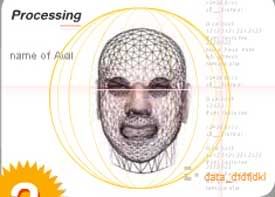 Users start by uploading a picture of themselves or their pet. Gizmoz turns the picture into a 3D model (see image to right), and the avatar can then be customized with a body, clothes, effects (scars, tattoos, etc.) and backgrounds. You then record a message and sound effects, and your avatar is created. The end result has a moving mouth and facial expressions while you talk, and the effect is quite stunning. Eyal calls it “bringing Pixar to the people.”
Users start by uploading a picture of themselves or their pet. Gizmoz turns the picture into a 3D model (see image to right), and the avatar can then be customized with a body, clothes, effects (scars, tattoos, etc.) and backgrounds. You then record a message and sound effects, and your avatar is created. The end result has a moving mouth and facial expressions while you talk, and the effect is quite stunning. Eyal calls it “bringing Pixar to the people.” 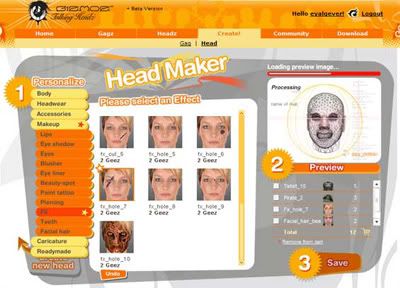


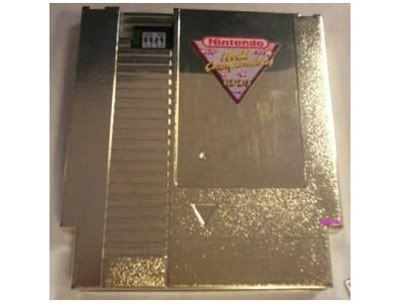
 More stocks arriving as demand ramps up
More stocks arriving as demand ramps up Microsoft has announced that more than 2 million copies of Xbox 360 title Gears of War have now been sold around the globe, making it the fastest-selling next-gen console game so far.
Microsoft has announced that more than 2 million copies of Xbox 360 title Gears of War have now been sold around the globe, making it the fastest-selling next-gen console game so far. 
